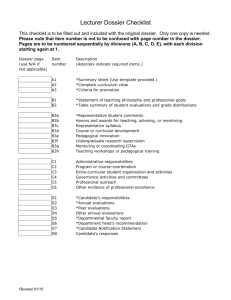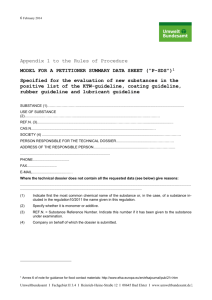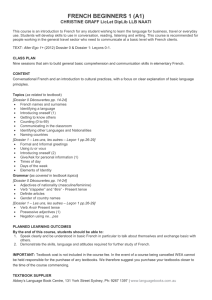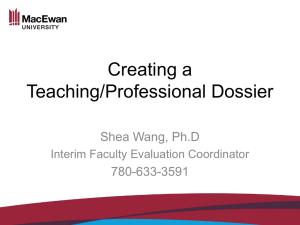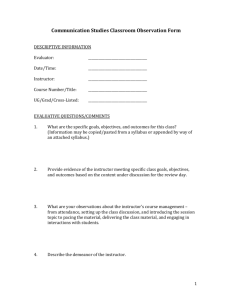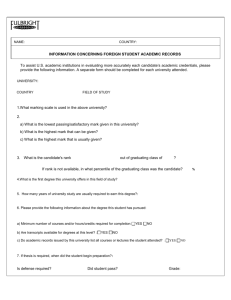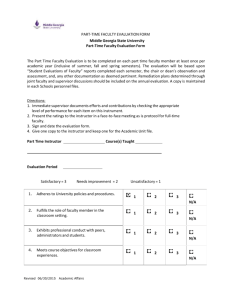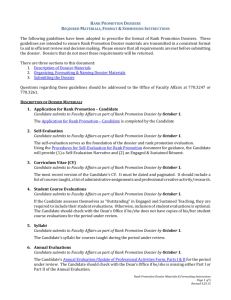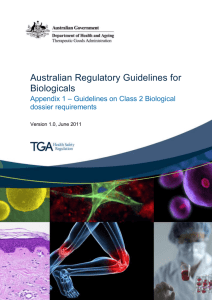SENIOR INSTRUCTOR PROMOTION CRITERIA AND PROCESS
advertisement
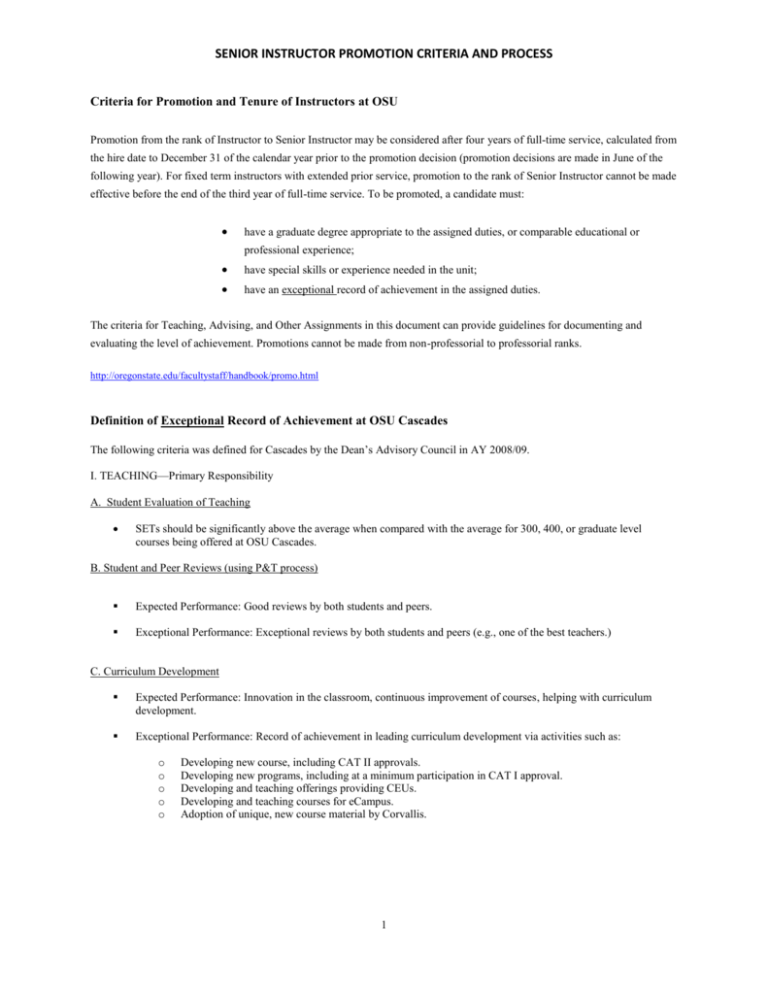
SENIOR INSTRUCTOR PROMOTION CRITERIA AND PROCESS Criteria for Promotion and Tenure of Instructors at OSU Promotion from the rank of Instructor to Senior Instructor may be considered after four years of full-time service, calculated from the hire date to December 31 of the calendar year prior to the promotion decision (promotion decisions are made in June of the following year). For fixed term instructors with extended prior service, promotion to the rank of Senior Instructor cannot be made effective before the end of the third year of full-time service. To be promoted, a candidate must: have a graduate degree appropriate to the assigned duties, or comparable educational or professional experience; have special skills or experience needed in the unit; have an exceptional record of achievement in the assigned duties. The criteria for Teaching, Advising, and Other Assignments in this document can provide guidelines for documenting and evaluating the level of achievement. Promotions cannot be made from non-professorial to professorial ranks. http://oregonstate.edu/facultystaff/handbook/promo.html Definition of Exceptional Record of Achievement at OSU Cascades The following criteria was defined for Cascades by the Dean’s Advisory Council in AY 2008/09. I. TEACHING—Primary Responsibility A. Student Evaluation of Teaching SETs should be significantly above the average when compared with the average for 300, 400, or graduate level courses being offered at OSU Cascades. B. Student and Peer Reviews (using P&T process) Expected Performance: Good reviews by both students and peers. Exceptional Performance: Exceptional reviews by both students and peers (e.g., one of the best teachers.) C. Curriculum Development Expected Performance: Innovation in the classroom, continuous improvement of courses, helping with curriculum development. Exceptional Performance: Record of achievement in leading curriculum development via activities such as: o o o o o Developing new course, including CAT II approvals. Developing new programs, including at a minimum participation in CAT I approval. Developing and teaching offerings providing CEUs. Developing and teaching courses for eCampus. Adoption of unique, new course material by Corvallis. 1 SENIOR INSTRUCTOR PROMOTION CRITERIA AND PROCESS II. MAINTIANING CURRENCY IN EXPERTISE Expected performance includes activities that maintain an individual’s currency, and bring recognition to the individual and to OSU Cascades. Expected Performance—A record of achievement that represent investment in self to maintain currency in area of expertise. Many options are available to this from attending conferences, workshops, and/or training, becoming involved in activities that provide professional development, belonging to professional societies, etc. Exceptional Performance-A record of achievement that represents investment in others in addition to self. Activities that demonstrate investment in others include: presenting at workshops, conferences, or training, publishing in practitioner and/or research journals or newsletters, serving in leadership positions in local, regional or national positions related to area of mastery, being an editor or on an editorial board, etc. III. SERVICE Expected Performance: Willingly participates in program service needs such as advising, program administration, recruiting, etc., (all related to the program). Exceptional Performance: Participation in both program needs and Cascade’s campus needs (e.g., diversity committee, committees outside of the individual’s program, space committee, JCC, OSU Day in Salem, safety committee, scholarship committee, etc.) Exceptional performing individuals are asked by other programs and staff to participate regularly in activities outside in their home program. Additionally service may include professional service. Appropriate balance is required between service to the program and campus, and service to the profession. Professional service would include activities described under currency in expertise that demonstrate active participation in groups or organizations outside of their own program. IV. COLLEGIALITY Expected Performance: Collegiality, professional integrity, and willingness to accept and cooperate in assignments. Exceptional Performance: In addition to expected performance criteria, the individual is sought out by others in multiple programs outside of their own for activities such as committee work, presentations, co-teaching, etc. There are many possibilities. Process for Promotion of Instructors at Cascades The candidate will: 1. Confirm support for promotion by the Dean of Academic Programs using the following information: Review of PROF reports. Informal review of performance vs. exceptional record of achievement criteria. 2. Compile dossier, which includes: Three page candidate statement of contribution. The university vita. The Dean of Academic Programs will: 1. Identify four external reviewers that will evaluators the dossier. The candidate participates in the selection process of external evaluators as outlined in the faculty handbook. The external reviewers summarize strengths, weaknesses, and make a recommendation. The evaluation letters are inserted into the dossier before it goes to the Senior Instructor Promotion Committee. 2. Initiate the student and peer review process of teaching with resulting evaluation letters inserted into the dossier. The candidates participate in the selection of the students as outlined in the faculty handbook. 2 SENIOR INSTRUCTOR PROMOTION CRITERIA AND PROCESS 3. Charter a Senior Instructor Promotion Committee and provide members with copies of the dossier. The Committee will be composed of five faculty members with the rank of Senior Instructor, Associate Professor or Full Professor. The home unit in Corvallis will be given the opportunity to participate on this committee as one of the five committee members. The letters from the supervisor and the promotion committee are to evaluate the relative strengths and weaknesses of the candidate's performance. These letters should comment on key points in the dossier and address all responsibilities identified in the position description, and provide a fair and balanced summary of all peer and external solicited evaluations. External evaluators should be identified only by a coded key when their comments are cited from these confidential letters. This committee is responsible for producing an evaluation letter based upon the information in the dossier including the external evaluations. This letter should include a recommendation regarding promotion. All members of the committee sign the letter above their typed names and rank. The evaluation letter is included in the dossier, which is then forwarded to the Dean of Academic Programs. 4. Complete a letter of evaluation based upon information in the dossier and personnel file. The evaluation letter summarizes strengths and weaknesses, external evaluation letters, and includes a recommendation. This evaluation letter is included in the dossier, which will be forwarded to the Vice President. Additionally, the Dean of Academic Programs is required to meet with the candidate to share the outcomes of the Senior Instructor Promotion Committee evaluation and the Dean’s evaluation prior to the dossier being forwarded to the next level for review. The candidate has one week after receiving all unit level reviews to add a written statement regarding these reviews, to be included in the dossier. The Vice President will: 1. Complete a letter of evaluation based upon information in the dossier. The evaluation letter summarizes strengths and weaknesses, external evaluation letters, and includes a recommendation. This evaluation letter is included in the dossier as it moves to the Provost Office for final evaluation and a decision. 2. Send a copy of the dossier with all letters to the home unit Dean in Corvallis for “information only” purposes. The promotion decision: Is made by the Provost and is based upon all information in the dossier. The decision results in one of the two following situations: If promotion is granted, the candidate’s rank is changed at the beginning of the next Academic Year. The raise associated with promotion is effective at the same time as the change in rank. If promotion is denied, a candidate may work with the Dean to create an improvement plan to reduce gaps and enhance performance with the objective of being promoted in the future. 3
